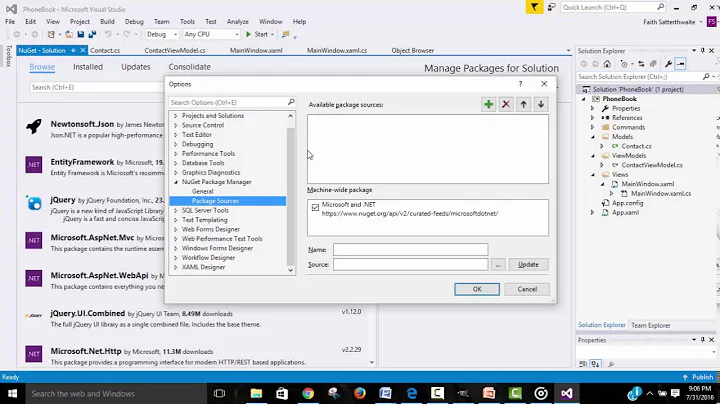Disable messages upon loading a package
Solution 1
Just use suppressMessages() around your library() call:
edd@max:~$ R
R version 2.14.1 (2011-12-22)
Copyright (C) 2011 The R Foundation for Statistical Computing
ISBN 3-900051-07-0
Platform: x86_64-pc-linux-gnu (64-bit)
[...]
R> suppressMessages(library(ROCR))
R> # silently loaded
R> search()
[1] ".GlobalEnv" "package:ROCR" # it's really there
[3] "package:gplots" "package:KernSmooth"
[5] "package:grid" "package:caTools"
[7] "package:bitops" "package:gdata"
[9] "package:gtools" "package:stats"
[11] "package:graphics" "package:grDevices"
[13] "package:utils" "package:datasets"
[15] "package:methods" "Autoloads"
[17] "package:base"
R>
Solution 2
Dirk's answer suppresses all messages and is not specific to messages that is generated while loading packages.
The more accurate solution to the asked question is:
suppressPackageStartupMessages(library(THE_PACKAGE_NAME))
A bit more detailed explanation can be found here
Solution 3
Use suppressPackageStartupMessages, see the answer by MehradMahmoudian. For completeness, adding here examples of usage:
For one library, use suppressPackageStartupMessages(...), for example:
suppressPackageStartupMessages(library(ggplot2))
For multiple libraries, use suppressPackageStartupMessages({...}), for example:
suppressPackageStartupMessages({
library(ggplot2)
library(ggdendro)
})
SEE ALSO:
Suppress package startup messages
Solution 4
library(ROCR, quietly = TRUE) might be a more elegant option.
Solution 5
By adding quietly = T as shown below will solve the issue:
suppressWarnings(suppressMessages(library("dplyr", quietly = T)))
In case of multiple package you can use :
## specify the package names
PKGs <- c("affy","gcrma","readxl","ggplot2","lattice" )
and them use lapply as below:
lapply(PKGs, library, character.only = TRUE ,quietly = T)
Related videos on Youtube
learner
Updated on April 27, 2022Comments
-
learner about 2 years
I have a package in R (ROCR) that I need to load in my R environment. Upon loading the package, a set of messages are printed. This is ordinarily fine, but since the output of my R script is being used for further analysis I want to completely disable all of this output. How do I do that? Furthermore, I'd prefer to do it without having to modify ROCR at all, so that future users of this script don't have to do that either.
So far:
sink()doesn't work here - redirecting both stdout and std err to/dev/nulldoes nothing for me.- Unsurprisingly,
options(warnings=-1)does nothing either, since these are not warnings, per se, being printed.
Any thoughts?
-
 Admin over 12 yearsWhat messages are being printed?
Admin over 12 yearsWhat messages are being printed? -
learner over 12 yearsWhile the entire output is unnecessary, the first several lines are:
Loading required package: gplots Loading required package: gtools Loading required package: gdata- Note that it won't let me format the message correctly. -
 Admin over 12 yearsThen load
Admin over 12 yearsThen loadgplots,gtools, andgdatabefore loadingROCR. -
Dirk Eddelbuettel over 12 years@Jack, nope, see my answer below for the proper fix.
-
 Admin over 12 years@DirkEddelbuettel - That works too. TIMTOWTDI.
Admin over 12 years@DirkEddelbuettel - That works too. TIMTOWTDI. -
Dirk Eddelbuettel over 12 yearsNo Jack, not really.
suppressMessages()also suppresses noisy textual message, at least from packages that conform, and protects you against other packages adding new dependencies which you'd need to reflect manually. -
Spacedman over 12 yearsObligatory "its a package, not a library" comment here
-
hadley over 12 yearsAren't you supposed to use
suppressPackageStartupMessages? -
Dirk Eddelbuettel over 12 yearsNo net gain apart from spending X more characters. Plus
suppressPackageStartupMessagessuppresses only startup messages where as my preferredsuppressMessages()suppresses any and all messages (but notcat()as I recall). But one is not supposed to use that in startup text. -
Matt Bannert about 8 yearsIt's also great that Dirk's suggestion suppress messages from depending packages as well when they're being loaded.
-
Adrian over 7 yearsIs there a way to capture those startup messages? I can capture warnings and errors, but don't know how to capture other such messages.
-
 Gaurav Singhal almost 6 yearsnot really, try
Gaurav Singhal almost 6 yearsnot really, trylibrary(data.table, quietly = TRUE) -
 jangorecki about 5 years@Adrian yes there is, wrap into tryCatch and provide message handler
jangorecki about 5 years@Adrian yes there is, wrap into tryCatch and provide message handler -
 PatrickT about 2 yearsneither
PatrickT about 2 yearsneitherquietly=TRUEnorverbose=FALSEsuppress the messages.














